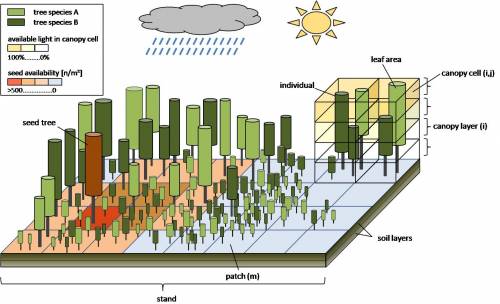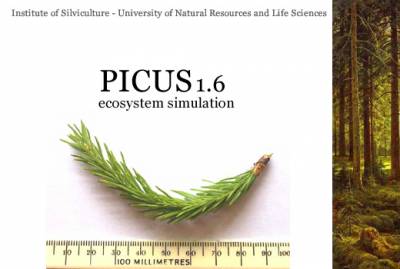Table of Contents
The Ecosystem Model PICUS
 PICUS is a hybrid forest gap model combining a 3D gap model approach with the physiologically-based production approach 3PG. The model simulates individual tree dynamics on 10×10m patches and structure tree crowns within 5m cells. It accounts for spatially explicit interactions between patches via a 3D light module, simulates explicit seed dispersal as well as ecosystem carbon, nitrogen and water cycles. The model includes a submodel of bark beetle disturbances in Norway spruce and a management module allowing any silvicultural treatment to be mimicked realistically. PICUS has been successfully evaluated in simulating equilibrium species composition as well as in reproducing longterm stand development in growth and yield experimental plots. The model has recently been successfully applied to support climate change adaptation planning.
PICUS is a hybrid forest gap model combining a 3D gap model approach with the physiologically-based production approach 3PG. The model simulates individual tree dynamics on 10×10m patches and structure tree crowns within 5m cells. It accounts for spatially explicit interactions between patches via a 3D light module, simulates explicit seed dispersal as well as ecosystem carbon, nitrogen and water cycles. The model includes a submodel of bark beetle disturbances in Norway spruce and a management module allowing any silvicultural treatment to be mimicked realistically. PICUS has been successfully evaluated in simulating equilibrium species composition as well as in reproducing longterm stand development in growth and yield experimental plots. The model has recently been successfully applied to support climate change adaptation planning.
Applications and Literature
PICUS is a modeling tool which is well covered in the open scientific literature. Frequently cited publications describing the core model are Lexer and Hönninger (2001) and Seidl et al (2005). More publications cover additional modules, e.g., for simulating barkbeetle disturbances or rockfall processes.
The model PICUS was also used in a number of application studies strongly focusing on the assessment of climate change impacts and the role of forest management to either mitigate the effects or adapt to the expected changes.
Team
 The development of the PICUS model was started more than 10 years ago by M.J. Lexer at BOKU Vienna. Over time, valuable contributions were made by researchers, PhD students and software engineers such as Karl Hönninger, Dietmar Jäger, Werner Rammer, Rupert Seidl, Stefan Schörghuber, Michael Maroschek, Andreas Schimmel, Florian Irauschek and others.
The development of the PICUS model was started more than 10 years ago by M.J. Lexer at BOKU Vienna. Over time, valuable contributions were made by researchers, PhD students and software engineers such as Karl Hönninger, Dietmar Jäger, Werner Rammer, Rupert Seidl, Stefan Schörghuber, Michael Maroschek, Andreas Schimmel, Florian Irauschek and others.
PICUS is currently applied at the Institute of Silviculture, BOKU Vienna and the Institute of Forest Ecology, ETH Zürich - if you’re interested in the program package please contact Manfred J. Lexer (email: mj.lexer(at)boku.ac.at).